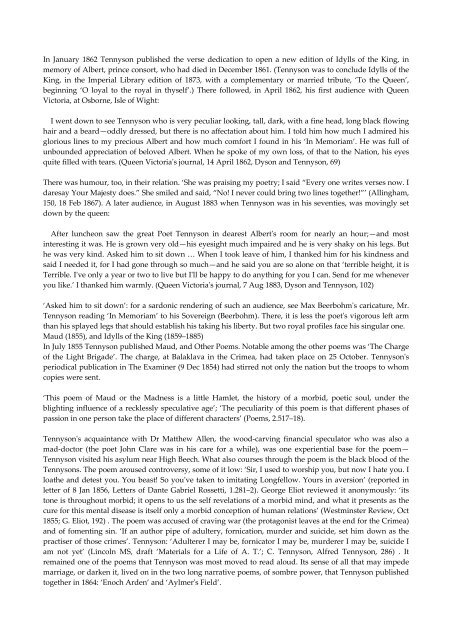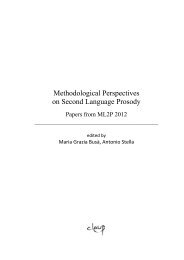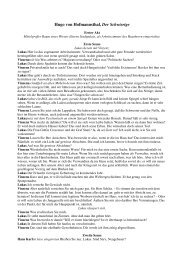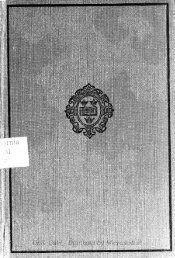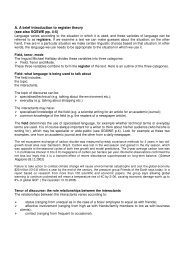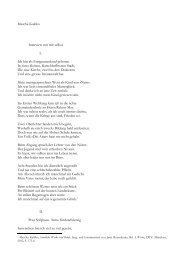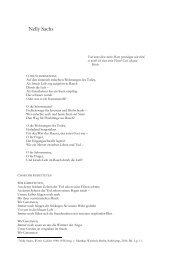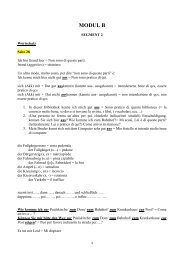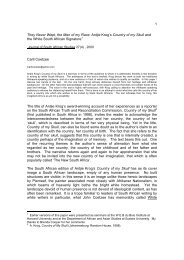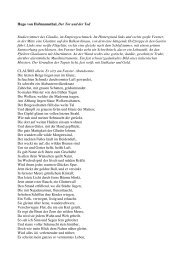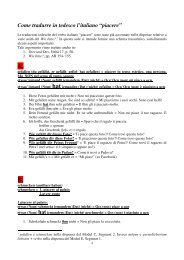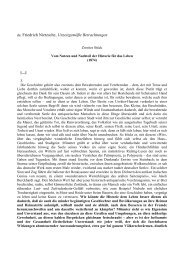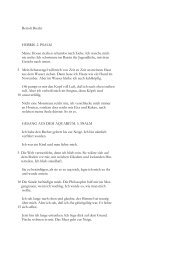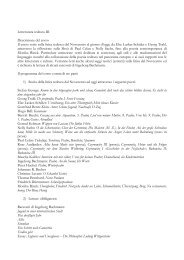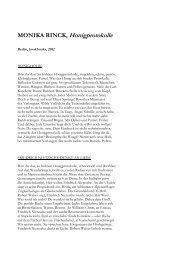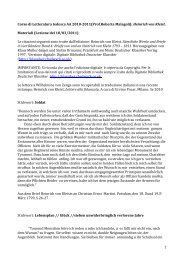The lives of the poets from The Dictionary of National Biography ...
The lives of the poets from The Dictionary of National Biography ...
The lives of the poets from The Dictionary of National Biography ...
Create successful ePaper yourself
Turn your PDF publications into a flip-book with our unique Google optimized e-Paper software.
In January 1862 Tennyson published <strong>the</strong> verse dedication to open a new edition <strong>of</strong> Idylls <strong>of</strong> <strong>the</strong> King, in<br />
memory <strong>of</strong> Albert, prince consort, who had died in December 1861. (Tennyson was to conclude Idylls <strong>of</strong> <strong>the</strong><br />
King, in <strong>the</strong> Imperial Library edition <strong>of</strong> 1873, with a complementary or married tribute, ‘To <strong>the</strong> Queen’,<br />
beginning ‘O loyal to <strong>the</strong> royal in thyself’.) <strong>The</strong>re followed, in April 1862, his first audience with Queen<br />
Victoria, at Osborne, Isle <strong>of</strong> Wight:<br />
I went down to see Tennyson who is very peculiar looking, tall, dark, with a fine head, long black flowing<br />
hair and a beard—oddly dressed, but <strong>the</strong>re is no affectation about him. I told him how much I admired his<br />
glorious lines to my precious Albert and how much comfort I found in his ‘In Memoriam’. He was full <strong>of</strong><br />
unbounded appreciation <strong>of</strong> beloved Albert. When he spoke <strong>of</strong> my own loss, <strong>of</strong> that to <strong>the</strong> Nation, his eyes<br />
quite filled with tears. (Queen Victoriaʹs journal, 14 April 1862, Dyson and Tennyson, 69)<br />
<strong>The</strong>re was humour, too, in <strong>the</strong>ir relation. ‘She was praising my poetry; I said “Every one writes verses now. I<br />
daresay Your Majesty does.” She smiled and said, “No! I never could bring two lines toge<strong>the</strong>r!”’ (Allingham,<br />
150, 18 Feb 1867). A later audience, in August 1883 when Tennyson was in his seventies, was movingly set<br />
down by <strong>the</strong> queen:<br />
After luncheon saw <strong>the</strong> great Poet Tennyson in dearest Albertʹs room for nearly an hour;—and most<br />
interesting it was. He is grown very old—his eyesight much impaired and he is very shaky on his legs. But<br />
he was very kind. Asked him to sit down … When I took leave <strong>of</strong> him, I thanked him for his kindness and<br />
said I needed it, for I had gone through so much—and he said you are so alone on that ‘terrible height, it is<br />
Terrible. Iʹve only a year or two to live but Iʹll be happy to do anything for you I can. Send for me whenever<br />
you like.’ I thanked him warmly. (Queen Victoriaʹs journal, 7 Aug 1883, Dyson and Tennyson, 102)<br />
‘Asked him to sit down’: for a sardonic rendering <strong>of</strong> such an audience, see Max Beerbohmʹs caricature, Mr.<br />
Tennyson reading ‘In Memoriam’ to his Sovereign (Beerbohm). <strong>The</strong>re, it is less <strong>the</strong> poetʹs vigorous left arm<br />
than his splayed legs that should establish his taking his liberty. But two royal pr<strong>of</strong>iles face his singular one.<br />
Maud (1855), and Idylls <strong>of</strong> <strong>the</strong> King (1859–1885)<br />
In July 1855 Tennyson published Maud, and O<strong>the</strong>r Poems. Notable among <strong>the</strong> o<strong>the</strong>r poems was ‘<strong>The</strong> Charge<br />
<strong>of</strong> <strong>the</strong> Light Brigade’. <strong>The</strong> charge, at Balaklava in <strong>the</strong> Crimea, had taken place on 25 October. Tennysonʹs<br />
periodical publication in <strong>The</strong> Examiner (9 Dec 1854) had stirred not only <strong>the</strong> nation but <strong>the</strong> troops to whom<br />
copies were sent.<br />
‘This poem <strong>of</strong> Maud or <strong>the</strong> Madness is a little Hamlet, <strong>the</strong> history <strong>of</strong> a morbid, poetic soul, under <strong>the</strong><br />
blighting influence <strong>of</strong> a recklessly speculative age’; ‘<strong>The</strong> peculiarity <strong>of</strong> this poem is that different phases <strong>of</strong><br />
passion in one person take <strong>the</strong> place <strong>of</strong> different characters’ (Poems, 2.517–18).<br />
Tennysonʹs acquaintance with Dr Mat<strong>the</strong>w Allen, <strong>the</strong> wood‐carving financial speculator who was also a<br />
mad‐doctor (<strong>the</strong> poet John Clare was in his care for a while), was one experiential base for <strong>the</strong> poem—<br />
Tennyson visited his asylum near High Beech. What also courses through <strong>the</strong> poem is <strong>the</strong> black blood <strong>of</strong> <strong>the</strong><br />
Tennysons. <strong>The</strong> poem aroused controversy, some <strong>of</strong> it low: ‘Sir, I used to worship you, but now I hate you. I<br />
loa<strong>the</strong> and detest you. You beast! So youʹve taken to imitating Longfellow. Yours in aversion’ (reported in<br />
letter <strong>of</strong> 8 Jan 1856, Letters <strong>of</strong> Dante Gabriel Rossetti, 1.281–2). George Eliot reviewed it anonymously: ‘its<br />
tone is throughout morbid; it opens to us <strong>the</strong> self revelations <strong>of</strong> a morbid mind, and what it presents as <strong>the</strong><br />
cure for this mental disease is itself only a morbid conception <strong>of</strong> human relations’ (Westminster Review, Oct<br />
1855; G. Eliot, 192) . <strong>The</strong> poem was accused <strong>of</strong> craving war (<strong>the</strong> protagonist leaves at <strong>the</strong> end for <strong>the</strong> Crimea)<br />
and <strong>of</strong> fomenting sin. ‘If an author pipe <strong>of</strong> adultery, fornication, murder and suicide, set him down as <strong>the</strong><br />
practiser <strong>of</strong> those crimes’. Tennyson: ‘Adulterer I may be, fornicator I may be, murderer I may be, suicide I<br />
am not yet’ (Lincoln MS, draft ‘Materials for a Life <strong>of</strong> A. T.’; C. Tennyson, Alfred Tennyson, 286) . It<br />
remained one <strong>of</strong> <strong>the</strong> poems that Tennyson was most moved to read aloud. Its sense <strong>of</strong> all that may impede<br />
marriage, or darken it, lived on in <strong>the</strong> two long narrative poems, <strong>of</strong> sombre power, that Tennyson published<br />
toge<strong>the</strong>r in 1864: ‘Enoch Arden’ and ‘Aylmerʹs Field’.


